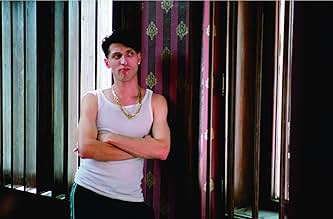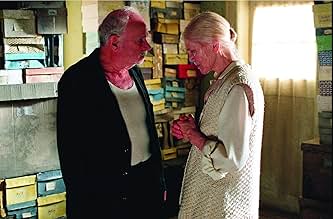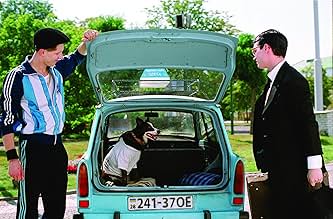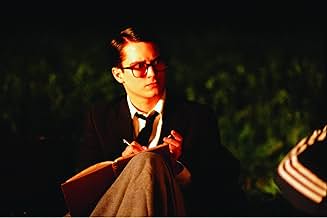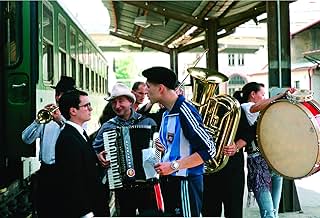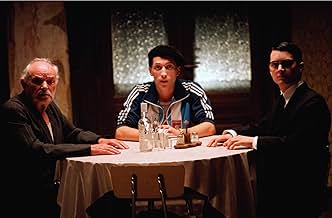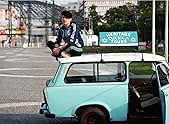Ein junger jüdischer Amerikaner begibt sich auf die Suche nach der Frau, die während des Zweiten Weltkriegs seinen Großvater aus einem ukrainischen Dorf gerettet hat, das von den Nazis kompl... Alles lesenEin junger jüdischer Amerikaner begibt sich auf die Suche nach der Frau, die während des Zweiten Weltkriegs seinen Großvater aus einem ukrainischen Dorf gerettet hat, das von den Nazis komplett zerstört worden war.Ein junger jüdischer Amerikaner begibt sich auf die Suche nach der Frau, die während des Zweiten Weltkriegs seinen Großvater aus einem ukrainischen Dorf gerettet hat, das von den Nazis komplett zerstört worden war.
- Regie
- Drehbuch
- Hauptbesetzung
- Auszeichnungen
- 7 Gewinne & 6 Nominierungen insgesamt
- Grandfather
- (as Boris Leskin)
- Ukrainian Band Member
- (as Sergej Rjabcev)
- Ukrainian Band Member
- (as Jurij Lemeshev)
Empfohlene Bewertungen
There is indeed plenty of humor: eccentric, un-subtle, sometimes somewhat twisted humor: the kind of humor I generally find very appealing indeed. But most of the humor is the kind that appears conscious at all times of things deeply serious, deeply sensitive, even deeply painful. The movie weaves together themes of Past and Present, Perception and Truth, Memory and Activity, Life and Death. The entire movie is suffused by the history of European anti-Semiticism in general, and of the Holocaust in particular.
How can Humor and Horror be combined in the same movie? The review I saw suggested that the humor is Absurdist. I don't think this is the case at all; at least not in the common sense. Instead, I think this movie stands in the tradition of much Jewish / Yiddish literature and theatre. I don't claim to be any kind of expert in this area; but from what I've seen, Humor is used, in this cultural context, both as a coping tool for the horribly tragic experiences of this people; and also Humor is used as a means of "recovering the Divine" for men and women who choose a path of Faith rather than a path of either Despair or Absurdism. See "Fiddler on the Roof" for Humor used in both ways in this rich tradition.
Elijah Wood (Jonathon) Wood wears horn rimmed glasses that really make him look, well, strange: compare Sin City when he wore the same kinds of glasses with chilling effect. In this movie, it's easy to see how the glasses become a metaphor for both his Search and for his Struggle between Perception and Truth. Eugene Hutz (Young Alex) and Boris Lesking (Old Alex) are both really just wonderful. Jonathon and Young Alex are from the same generation, yet seem so very, very different; and then find that they are not so different after all. And the way in which the Apparent Narrative Voice changes gradually from that of Jonathon to that of Young Alex .. as a journey of intended discovery for Jonathon becomes one of discovery for both Young Alex and Old Alex ... is to me so very moving.
There are some wonderful scenes and panoramas from (I'm told) Prague and environs, standing in for the Ukraine of the story line. All feels very authentic and seems to give a wonderful sense of place; although I've never been myself to the Ukraine and can hardly testify to this from first hand experience.
All in all, if you're looking for light comedy, I would not recommend this movie at all. On the other hand, if you are interested in a wonderful, delightful, and deeply moving film, please, check out this wonderful movie.
For those who haven't watched the film, perhaps you should stop reading here.
Jonathan is a collector. His love for his grandparents is boundless. He watches as his grandfather dies and as his grandmother is on what appears to be her death bed. On a clear moment, this dying woman gives Jonathan a picture and an amber ornament for his collection. Watching the photograph, taken a long time ago, a young couple are seen together. Watching makes Jonathan think it shows the grandfather and his girlfriend, taken on happier times. Watching the snapshot seems to be the motivation for this intense young man to go looking for his ancestors' past in the Ukraine.
Jonathan has made arrangements with a travel agency, Heritage Tours, of Odessa for his trip to Trochenbrod, the mythical place where his grandfather came from. The agency is handled by an older man, who claims to be blind, and his grandson, Alex, a man who loves the pop American culture that has captured his imagination, as well as his contemporaries in the country. Alex speaks a kind of English no one speaks and his conversation and translation, for Jonathan's benefit are hilarious to our ear for the use of sometimes unheard English terms. The old man insists in taking his dog, Sammy Davis Jr., against the wishes of Jonathan, who doesn't want to sit next to the snarling and barking animal during the trip.
As they embark in search of Trochenbrod, it's clearly that his companions, especially the old man has no clue where he is going. At this point, the film becomes a road movie, as the three characters riding the back roads of the country become more acquainted with one another. As the trio arrive at the sunflower field with the house at the end, it indicates they have indeed come to the right place. Some places are a clear reminder of the conflicts of the past.
The older woman, living in the isolated place, is the missing link of the story. She is able to put things into the right perspective. But here is where the story changes its emphasis from Jonathan, who clearly has come to the land of his ancestors, to the old man. We watch as this older man starts remembering things about himself. This, in turn, changes the dynamic of the film as we discover how connected Jonathan and his guides have been all the time.
Some criticism in these pages have expressed opinions about the accuracy of the story, which after all, it's a work of fiction and liberties have been taken. It would have been impossible to make another film including so much that is contained in the book. The great way the film is divided into different chapters is a clever way to let the viewer know what's about to be seen.
Elijah Wood, a magnificent film actor, does an excellent work by underplaying Jonathan. Mr. Wood makes one of his best appearances in any film with his interpretation of the main character. The felicitous casting of Eugene Hutz as Alex, the Ukranian tour assistant and translator, seems to be an idea made in heaven. Mr. Hutz is about the best thing in the film. His arcane usage of English gives the film a funny angle that delights the viewer. Boris Leskin as Alex's grandfather and driver of the tour car makes a valuable contribution to the film, as well as Laryssa Lauret, who is seen in the last part of the movie.
The excellent cinematography of Matthew Libatique brings the splendor of the Czech Republic's countryside in all its magnificence. The musical score by Paul Cantelon is heard in the background adorning the film in ways that it adds a richness to the movie.
Above all, this is a triumph for Liev Schreiber, the first time director that will surely go far in whatever he decides to do next.
No spoilers here. The summary is, as IMDb describes, a young man's journey to the Ukraine to follow his roots and find the village where his father grew up.
The dialog is in English and Ukrainian (and Russian too, I believe). This allows for some wonderfully linguistically-based moments as one character interprets, more or less faithfully, for the English speaker in the group, depending on the circumstances.
The scenery is wonderful and the musical score is a treat with wonderful Eastern European influences. Be sure you stay through the credits for the final tune.
This is Lieve Schreiber's directorial debut and is well done. I give this film a 9, one of the best films I've seen in a long time. I recommend it highly.
I would have given the movie a higher rank, but I feel that the translation from Russian/Ukrainian into English is not done too well. At times, that is clearly deliberate. At times, I could not find a better way to re-tell the situation as it has a slight Lost in Translation effect. At times, it was just poorly done. Thankfully, there are very few poorly done moments. At one point, the English translation is a direct opposite of what the actors actually said.
However, I feel that a significant amount of the humor comes from a deliberate mis-translation from Russian to English. While some viewers may feel that they are left out, there are situations which are difficult to convey in a few phrases that have yeas of history and culture behind them. You definitely get the most out of this movie if you understand Russian. You get even more if you understand the cultural differences between primarily Russian-speaking Odessa and primarily Ukrainian-speaking L'viv. Some anecdotes are simply incorrect, albeit funny.
Regardless of the 8, I still add this movie to my favorites. I feel that much of what is incorrect is left as-is for a reason, and overall, the movie does very well to convey life in Ukraine (the old and the new), the friendliness, though maybe rough up-front, of the people and the story itself. Well done.
Based on the novel by Jonathan Safran Foer, Everything Is Illuminated is the directorial debut of actor Liev Schreiber. Schreiber also wrote the screenplay. In the movie, Jonathan (Elijah Wood) obsessively collects items from his family, from toothbrushes to retainers to scraps of paper which he then seals in ziploc bags and pins to a wall in his house to record his family history. But the space for his grandfather is conspicuously bare. All Jonathan really has of him is a piece of jewelry and an old photo of him with a woman who hid him from the Nazis during the Second World War. Jonathan decides to undertake a quest to Ukraine to find the woman, thank her, and learn more about his grandfather.
His quest is aided there by a couple of characters who run a tourist company for Jewish people, including a young man obsessed with western culture (Eugene Hutz), his grandfather (Boris Leskin), who thinks he is blind and who may have memories and demons of his own from the war, and his grandfather's temperamental seeing eye dog.
The screenplay effectively combines both humour and drama as the three characters travel through the countryside looking for Jonathan's grandfather's town, driving deeper and deeper into the memories of the past. The best performance probably comes from Eugene Hutz, playing Alex Jr., who starts the movie as a tracksuit-wearing, break dancing slacker just out to have fun but evolves into something more as not only Jonathan, but all the characters gain their own illumination.
Liev Schreiber, Elijah Wood, and Eugene Hutz attended the screening and did a very humorous Q&A after the film:
- Schreiber was very close to his grandfather, who was a Ukranian immigrant, and who died in 1993. This caused him to start to write to get his memories down on paper. Meanwhile, he was asked to do a reading of Foer's short story, The Very Rigid Search, which was an excerpt from the still unpublished novel. Schreiber was blown away by the quality of the writing, saying that Foer had done in 15 pages what Schreiber tried to do in 107. Schreiber approached Foer and they talked about their grandfathers, culture, movies, and the nature of short-term memory in America; in the end, Foer agreed to let Schreiber adapt the book.
- Schreiber's own project was intended to be a road movie, but the book has parallel narrative that is an imagined chronological history of the town of Trochenbrod that spans 500 years; given his budget and limitations as a filmmaker, he said he'd leave that to Milos Forman and take the road trip instead. This imagined chronology was what moved him to make the movie in the first place, the idea that "a past lovingly imagined was as valuable as a past accurately recalled".
- Schreiber said the movie was a series of happy accidents. After searching unsuccessfully in Ukraine for an actor, he was walking through the Lower East Side in New York, when he saw a poster of a woman centaur, topless from the waist up, with an insane cossack sitting astride her. Under the poster said the name Gogol Bordello Ukranian Punk Gypsy Band.
Eugene Hutz then took over the story. He had never pursued acting as music was his first passion. One day, a friend gave him the book, and he thought it was written in a manner similar to how he writes music; screw sentences/syntax, language is my own.
Later, they got a call from a production company, looking for eastern European music that was medieval but modern. Hutz met with Schreiber, and he soon found the movie was based on the book he just happened to be reading. Not long after that came up, Schreiber asked Hutz what he thought about Alex and whether he could do the character by any chance.
- Foer and Schreiber talked about the film in the fall of 2001, shortly after the events of September 11. Both were in Europe at the time and they talked about the derogatory comments they were hearing about Americans, which led Schreiber to want to try to find an articulate American who would defy the stereotype that Europeans have of Americans. Someone who was awkward, vulnerable, flawed, innocent, and looking for history beyond the borders of his own country. Schreiber started thinking about who that was, and Elijah came up.
One of Schreiber's inspirations as a filmmaker is Emir Kusturica (I think that's who he said, who also directed a segment in another festival movie, All the Invisible Children) who said "you don't look for the actors, you look for the people." Schreiber said there is something about who Elijah is that he has a generosity of spirit and a sincere goodness as a human being, that came across on film. Schreiber said that the eyes are important when trying to articulate a character who is an observer, and that if "eyes are the doors to the soul, Elijah's are garage doors."
- Elijah Wood had fun with a question about the similarities between his character Kevin in Sin City and Jonathan in this movie as both are sort of a blank slate on which emotions are projected. Wood replied that Jonathan may seem still and seemingly emotionless, but it is all about his observations, about his experiences with other characters and the environment he was in.
- On the differences between directing and writing: Schreiber said he likes writing a lot more and jokingly described directing as "hell". After his grandfather died, Schreiber started to think about how to preserve some sense of history and himself; is he content driven or not, or just good at interpreting other people's work? He said he loved the exercise of figuring out what is emotional to you, important to you.
Wusstest du schon
- WissenswertesEugene Hutz's band Gogol Bordello appears as the polka band that greets Elijah Wood at the train station.
- PatzerWhen the Grandfather repeatedly sounds the horn of the car, he presses the middle of the steering wheel to do so. In the Trabant, the horn is activated by pushing the signal light lever forward.
- Zitate
Alex: I have reflected many times upon our rigid search. It has shown me that everything is illuminated in the light of the past. It is always along the side of us, on the inside, looking out. Like you say, inside out. Jonathan, in this way, I will always be along the side of your life. And you will always be along the side of mine.
- Crazy CreditsSeveral songs are credited to the New York punk/Gypsy/Jewish klezmer band, Gogol Bordello, which is led by Eugene Hutz, who plays Alex in the film (the same band greets Jonathan when he arrives on the train). The last of these songs, "Start Wearing Purple (For Me Now)," which plays over the end credits, is credited to both a correct spelling (Gogol Bordello), dg and Gogol Bodello, an incorrect spelling.
- VerbindungenFeatured in Today: Folge vom 24. November 2005 (2005)
Top-Auswahl
Details
- Erscheinungsdatum
- Herkunftsland
- Offizieller Standort
- Sprachen
- Auch bekannt als
- Everything Is Illuminated
- Drehorte
- Produktionsfirmen
- Weitere beteiligte Unternehmen bei IMDbPro anzeigen
Box Office
- Budget
- 7.000.000 $ (geschätzt)
- Bruttoertrag in den USA und Kanada
- 1.712.337 $
- Eröffnungswochenende in den USA und in Kanada
- 66.806 $
- 18. Sept. 2005
- Weltweiter Bruttoertrag
- 3.601.974 $
- Laufzeit
- 1 Std. 46 Min.(106 min)
- Farbe
- Sound-Mix
- Seitenverhältnis
- 1.85 : 1


